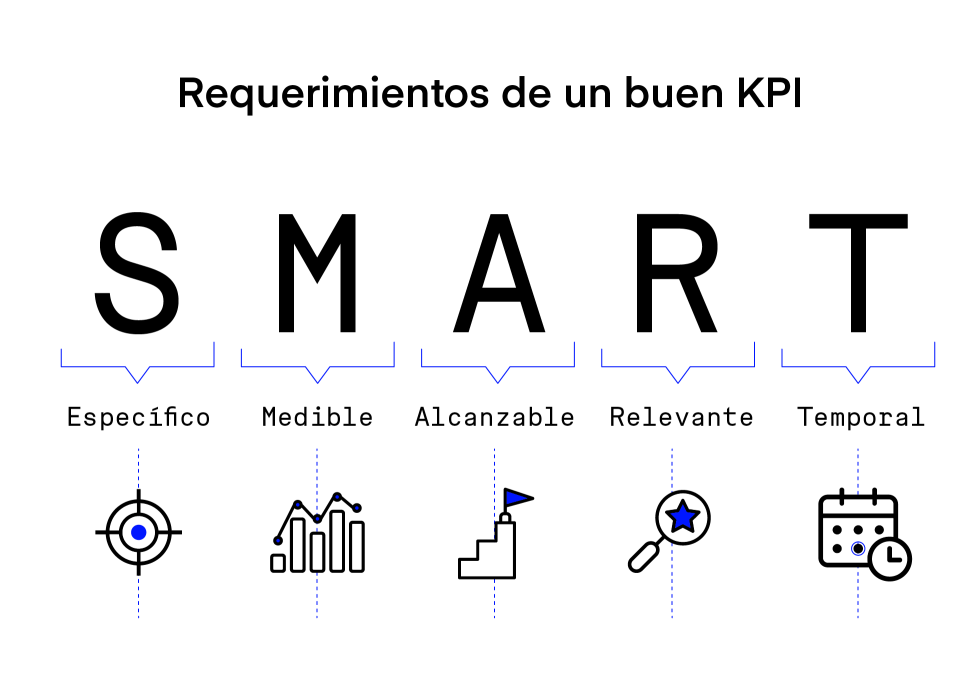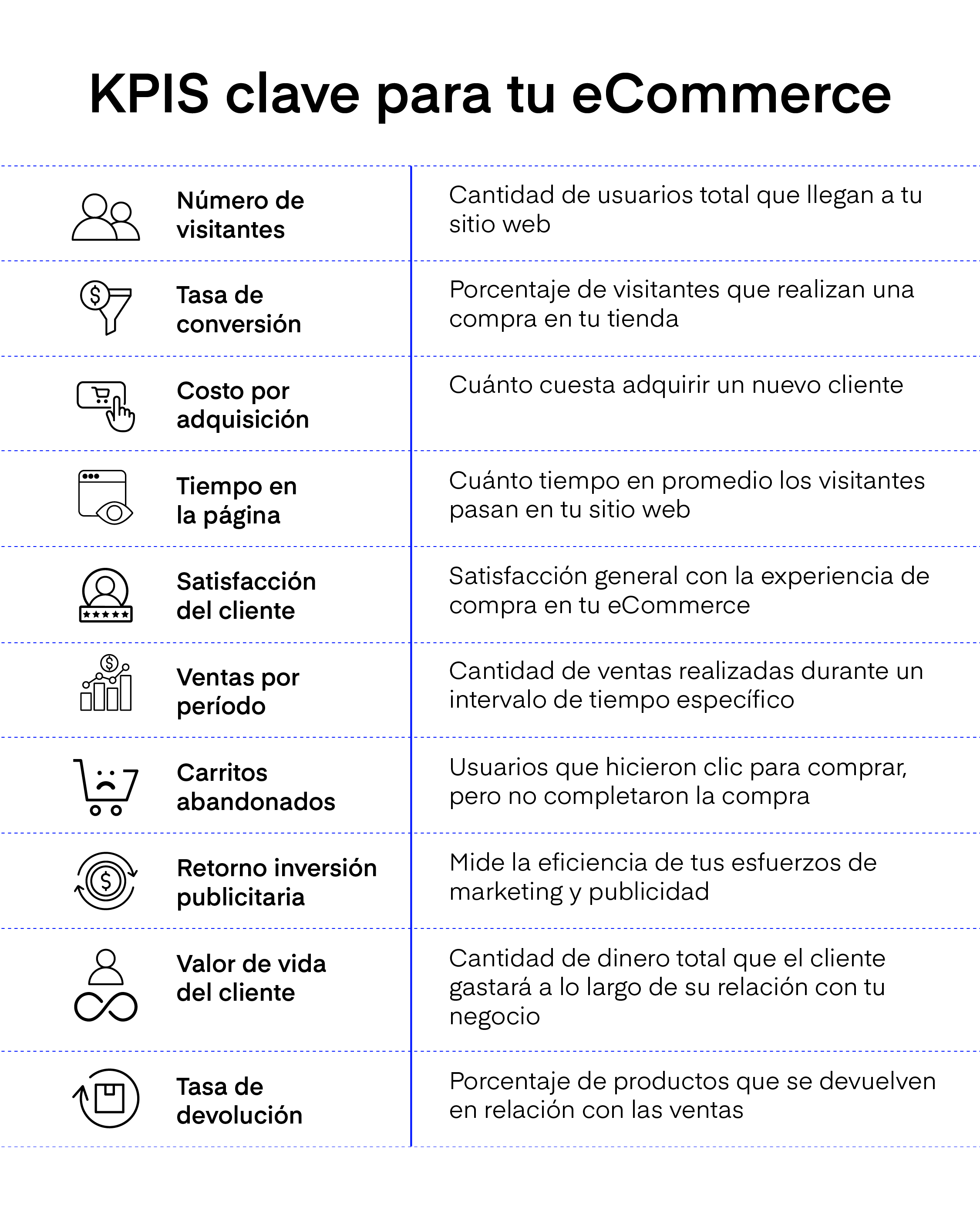
A Key Performance Indicator (KPI) is a key metric used to measure the performance and success of your eCommerce.
Let's assume you run an eCommerce specialized in selling fashionable clothing and accessories. By monitoring your KPIs, you notice that the conversion rate has significantly decreased in recent weeks.
Faced with this finding, you can start to take actions to turn the situation around:
Conduct A/B tests on the payment page to identify and improve any design or functionality issues.
Optimize the checkout process to make it more intuitive and faster.
Provide additional discounts or special promotions to incentivize purchases.
The use of indicators helps us make decisions, whether in business operations to understand how it's performing or to review sales performance, marketing strategies, and investments.
An eCommerce without clear KPIs can face several challenges and difficulties that will negatively impact its performance. Such as a lack of direction and focus or the inability to identify areas for improvement.
Using KPIs in your online store provides the ability to measure performance objectively. Through the collection and analysis of quantifiable data, you get a clear perspective on how the eCommerce is operating in reality.
What is a Key Performance Indicator (KPI)?
A KPI is a quantifiable metric used to assess the performance and success of a company, project, team, or activity in relation to the established objectives and goals.
These indicators show whether you are achieving the fulfillment of strategic objectives or not; being a tool that allows determining precisely the success or failure of your online store.
Take, for instance, the monthly billing, where goals were set in advance, and when reviewing the results, we can determine the degree of fulfillment of these.
We can say that KPIs are data that can be quantified and are linked to specific goals and periods and allow measuring the success of your strategy in your eCommerce. Thus, the function of the KPIs is to show what is working and what needs improvement.
To refer to a KPI as such, this value must meet a series of requirements that are qualified as SMART:
Specific: They must be clear, avoiding ambiguities. They answer the questions: What is to be achieved? Why is it important? Who are involved?
Measurable: They must be quantifiable and assessable. They answer the question: How will progress or success be measured?
Achievable: They must be realistic goals achievable with the resources at hand. They answer the question: Is it possible to achieve it with the available resources?
Relevant: They must be significant and aligned with the general objectives of the organization or project. They answer the question: Is it relevant to the broader objectives?
Time-bound: They must have a specific timeframe or period for their accomplishment. They answer the question: In what timeframe should they be achieved?

Benefits of KPIs
They provide information on process performance, making it easier to identify areas for improvement.
They assist in making informed decisions.
Greater efficiency and effectiveness, maximizing available resources.
Faster, more transparent, and more understandable when delivering results.
They help control and monitor actions taken, from customer satisfaction levels to the success of a new advertising campaign.
They can serve as a communication tool between managers and employees of the same business.
Why are KPIs important for your eCommerce?
KPIs are essential for eCommerce because they assist with performance measurement, meaning they allow for the quantifiable assessment of the actual business performance. And they can lead to growth opportunities or the anticipation of market demand changes.
Furthermore, they provide objective data that supports decision-making based on information, making it possible to identify areas of success and those requiring improvements.
For all these reasons, you can realize that KPIs are vital for the success of your eCommerce, as they offer an objective and quantifiable view of its performance.
They assist business owners and managers in making data-driven decisions, optimizing their strategies, and ensuring that the business aligns with its objectives and goals.
Key KPIs for your eCommerce
These KPIs will provide you with valuable information on how your eCommerce is performing and will assist you in making informed decisions to continuously improve your online business. Remember, KPIs should be tailored to your specific goals and strategies.
Number of visitors: Measures the total number of people reaching your website. It can help you assess the effectiveness of your marketing strategies and gauge the popularity of your eCommerce.
Conversion rate: The percentage of visitors who make a purchase in your store. It's crucial for understanding how well you're converting traffic into sales and identifying opportunities to enhance the buying process.
Cost per acquisition (CAC): Represents how much it costs to acquire a new customer. It includes marketing and advertising expenses divided by the number of new customers. It helps evaluate the efficiency of your customer acquisition strategies.
Time on page: This metric indicates the average time visitors spend on your website. A longer stay can suggest a higher engagement with your content and products, which might influence higher conversions.
Customer satisfaction score: Reflects the overall satisfaction with the shopping experience in your eCommerce. You can gather this information through surveys, reviews, and direct feedback. A high score suggests satisfied and loyal customers.
Total sales per period: One of the main eCommerce KPIs, since the business goal is to sell.
Average cart value: Measures the average value of each purchase made in your store. It's calculated by dividing total revenues by the number of orders.
Returning visitors: Those who revisited your website; this data indicates people liked what they saw.
Pages per visit: The number of pages a user visits each time they browse your website. If data shows four or more pages per visit, it means the customer is highly interested in both your brand and product.
Bounce rate: The number of users leaving the page without taking any action. A high bounce rate means you're not leaving a good impression on the customer.
Advertising return on investment (ROI): Measures the efficiency of your marketing and advertising efforts. It's calculated by dividing the profits generated by advertising investment by the cost of the investment and multiplying by 100.
Customer lifetime value (LTV): The total amount of money a customer will spend throughout their relationship with your business. This indicator, linked to customer satisfaction levels, aids in evaluating customer retention efforts.
Return rate: The percentage of products returned compared to total sales. It's crucial to determine the problem's source and pull products until a solution is found.
Abandoned carts: Measures users who clicked to purchase but didn't complete the transaction, indicating potential checkout process issues.
It's crucial to clarify what you want to measure, why you're measuring it, and what actions you'll take in response to the indicators before starting to measure.
Select KPIs aligned with your business objectives and monitor them regularly to make informed decisions and continually improve your online store.
If you want your business to continue growing, you must define the right metrics. The information provided by KPIs about process performance will assist in setting objectives and goals, as well as in effective decision-making.
By efficiently analyzing KPIs, your company will operate strategically, enhancing processes and outcomes.

Tools to monitor your KPIs
There are various tools you can use to effectively measure and track your eCommerce KPIs. These tools allow you to gather, analyze, and visualize relevant data to assess the performance of your online business. Here are some popular options:
Google Analytics: One of the leading tools for web analytics. It provides detailed information about site traffic, conversion rates, user behavior, traffic sources, and more. You can set up custom goals and events to track specific KPIs.
Google Search Console: It offers insights about your site's performance in Google's search results. You can view data on search queries, clicks, impressions, CTR, and more.
Hotjar: Provides heat maps, user session recordings, and surveys to understand how visitors interact with your site. This can help you identify areas of improvement in user experience.Asegúrate de que estas herramientas te permitan rastrear los KPIs que son más relevantes para tu eCommerce y que te brinden insights accionables para mejorar continuamente tu tienda online.
Ensure that these tools allow you to track the KPIs most relevant to your eCommerce and provide actionable insights to continuously improve your online store.
KPIs can assist your eCommerce
As we've seen, KPIs play a crucial role in the success and growth of your eCommerce by offering a range of valuable benefits. They provide clear guidance, inform strategic decisions, and assist you in continually enhancing your operations and results.
KPIs act as strategic beacons, guiding the company in the right direction. Moreover, they establish a path that helps maintain focus on key priorities and align team efforts with strategic objectives.
Together, KPIs are fundamental tools to drive growth, optimization, and enduring success of an eCommerce in a competitive and ever-evolving market.


